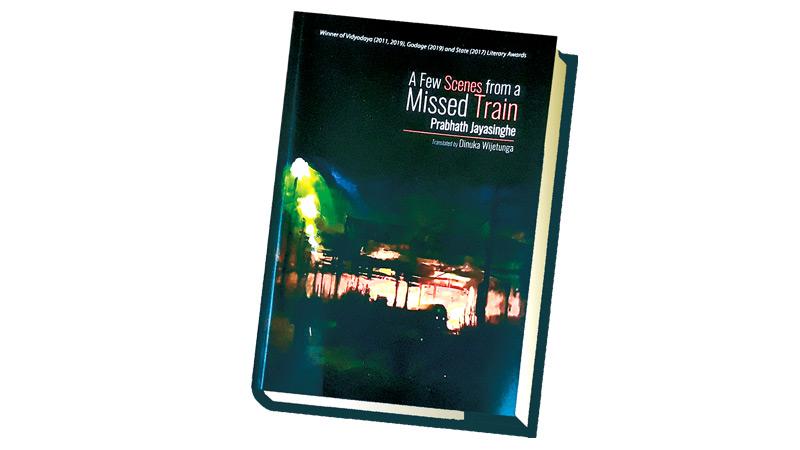
Prof. Prabhath Jayasinghe of the Colombo University’s Faculty of Management and Finance is a writer with a leaning to explore the surreal and unreal, as evinced by some of his short fiction. The book titled ‘A Few Scenes from a Missed Train’ is a collection of Jayasinghe’s short fiction translated to English by Dinuka Wijetunga, who herself is an academic from the Colombo University’s Faculty of Management and Finance.
 A publication by Sarasavi Publishers, ‘A Few Scenes from a Missed Train’ comprises of five short stories, which are: ‘A Few Scenes from a Missed Train’ (title story), ‘The Diary of a ‘Wayambadiga Resident’, ‘Hockey without Sticks’, ‘Chakrayudha’, and ‘Swarna Kaya’.
A publication by Sarasavi Publishers, ‘A Few Scenes from a Missed Train’ comprises of five short stories, which are: ‘A Few Scenes from a Missed Train’ (title story), ‘The Diary of a ‘Wayambadiga Resident’, ‘Hockey without Sticks’, ‘Chakrayudha’, and ‘Swarna Kaya’.
The short stories themselves are works which have been previously published in collections of short stories by Jayasinghe, and are therefore a selected translation of previous works originally published in Sinhala.
On this matter it must be said, that as the translator, Wijetunga provides in depth insights into Jayasinghe’s craft as a fiction writer as well as the challenges she faced in the process of translation.
Not merely cultural nuances between the languages had to be grappled with but also the hurdles of grammar when capturing the correct tenses and context and relaying it from Sinhala to English without losing the essence of the original text.
In this regard the following from the translator’s note is significant: “For me, maintaining chronological relationships in the narrated events amidst the complicated time shifts was one of the biggest challenges.
The times I got lost in ‘had’s ‘had had’s, and ‘has had’s and ‘will’s and ‘would’s were countless.”
The themes of these works of short fiction have an unmistakable supernatural element that is integral to the plots.
There are also the themes of armed conflict, ethnic violence, and ethnic tensions which run as significant veins in stories as ‘A Few Scenes from a Missed Train’, ‘The Diary of a ‘Wayambadiga Resident’, ‘Hockey without Sticks’ as well as ‘Swarna Kaya’.
Fiction
In this regard it must be said that Jayasinghe’s craft shows very little congruence with traditional realist fiction. His craft in fact is of the post – realist tradition as noted by Wijetunga in her translator’s note. Although she states that some critics have suggested Jayasinghe adopts a style similar to Franz Kafka, I believe there aren’t sufficient elements in the short stories themselves, to see distinct echoes of the Kafkaesque mould.
However, when looking at Jayasinghe’s craft from perspectives of postmodernist approaches, including the tropes of Latin American Boom literature, elements such as supernatural spirits being in communication and harmonious communion with humans, disembodied astral forms of existence, and narratives that present interlocution between the dead as they gaze upon the world of the living among whom they walk as ‘disenfranchised voices’, strands of ‘Marquezian’ magical realism can be identified.
By which I mean elements that relate to the craft of the late great Gabriel Garcia Marquez whose works are seminal in understanding the ethos of the Latin American Boom genre.
Varying flavours and rhythms
There are varying paces in the flow of emotions in the characters that convey the stories Jayasinghe delivers to his readers.
There is at times a sense of detachedness in the manner in which events and emotions are narrated while in certain instances the engagement is quite emotive.
All five short stories of this collection do not therefore in my opinion bear a common rhythm and pace. Rather each story brings its own flavour according to theme and pace and thereby has a rhythm to each narrative, which disallows each of the five short stories to be seen as thematically bound counterparts of a common fabric.
Jayasinghe’s fiction may not resonate with the tastes of those who seek the flavours of realist fiction.
The narratives demand the reader be prepared to see with openness what may seem bizarre and unreal, as possibilities of the human imagination. Going further it can be noted on the political angle used by the author, his craft includes metaphoric use of fictional ethnic identities as ‘Wayambadiga’ and ‘Esanadiga’, which project identities based on provincial demarcations in Sri Lanka (as of the Wayambadiga province and North-Eastern Province) to reflect the larger issue of how Sri Lanka faced a terrorist war for nearly thirty years.
Jayasinghe thus explores in his fictional settings, in the context of ethnic tension based conflicts and violence, human needs of survival and desires for love and belonging; while overtly intermingling elements of the supernatural and surreal, to go beyond the traditional track.
A laudable work
‘Hockey Without Sticks’ which relates to how an era of brutal terrorist attacks which claimed lives of civilians, evokes a very strong impression as to how memories of the past are haunting to not only the living, but the deceased as well. Do we ever give thought as to how the dead may feel about the world they were forced to leave behind? After all, whatever the cause may have been, is there anything in this world as a ‘voluntary death’? These are some of the nuanced queries in the subtext of the craft found in Jayasinghe’s short fiction.
‘A Few Scenes from a Missed Train’ was the recipient of the State Literary Award for Short Stories in Translation, in 2020. It is an accomplishment that deserves applause. Both Prabhath Jayasinghe as the author and Dinuka Wijetunge as the translator deserve commendation for ‘A Few Scenes from a Missed Train’ which can surely be appreciated as an Avant-garde work of Sri Lankan fiction.
